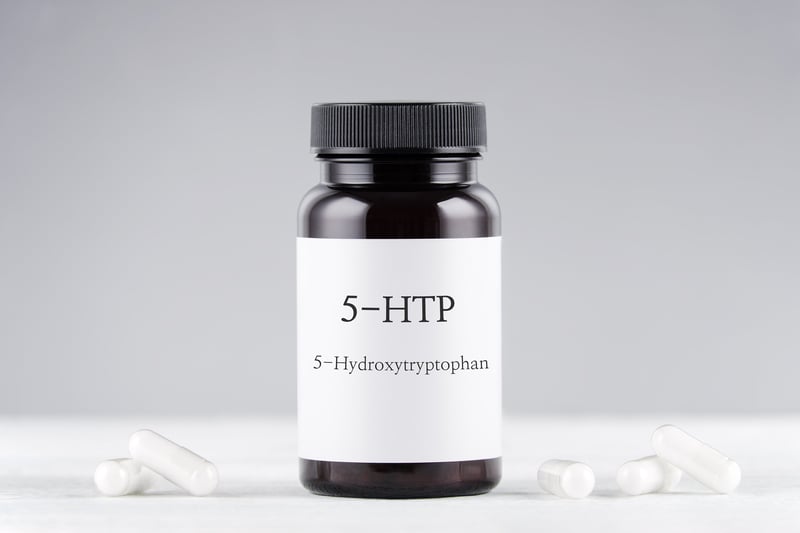Get Healthy!

- Kirstie Ganobsik
- Posted May 24, 2023
5-HTP Supplement: What Is It, and Can It Help You?
The supplement known as 5-HTP is available in both natural and synthetic versions and is used by some people to treat a variety of wellness issues.
Here's a look at what this supplement is, its safety profile, side effects and drug interactions, and the potential health benefits that 5-HTP has to offer you for a balanced lifestyle.
What is 5-HTP?
In your body, 5-hydroxytryptophan (5-HTP) is a chemical produced naturally from the essential amino acid called tryptophan. The U.S. National Library of Medicine states that it's the forerunner of serotonin.
Natural supplements that contain 5-HTP are made from a plant called Griffonia simplicifolia that's native to countries in West Africa such as Congo, Sierra Leone and Ghana, according to the University of Texas El Paso.
A review published in the International Journal of Molecular Science by researchers from the University of Turin in Italy found that in recent years, scientific breakthroughs have also allowed for the production of some synthetic 5-HTP supplements.
5-HTP benefits
Because 5-HTP is converted into serotonin (also known as 5-hydroxytryptamine or 5-HT) in the body, it provides a number of potential benefits for your overall health and well-being.
Depression
The Natural Medicines Comprehensive Database rates 5-HTP as "possibly effective" for treating depression, according to the National Library of Medicine, and it may work as well as some antidepressant drugs that are used to treat the condition.
Researchers who were studying 5-HTP's effects on digestive tract issues in mice noted that it showed promise for treating both depression and constipation. A lack of the neurotransmitter serotonin in gut neurons was observed in the study, which was published in Gastroenterology.
The authors said in a Columbia University news release that this was similar to the limited serotonin levels observed in brain neurons of people with depression.
"The gut is often called the body's 'second brain,'" explained lead study author Dr. Kara Gross Margolis, an associate professor of pediatrics and molecular pathobiology at New York University. "It contains more neurons than the spinal cord and uses many of the same neurotransmitters as the brain. So, it shouldn't be surprising that the two conditions could be caused by the same process."
Although there's still limited evidence to support it, 5-HTP is used by some people to help manage several other health issues as well.
Anxiety
The review from the University of Turin found that 5-HTP significantly reduced anxiety symptoms in a few studies. It seemed particularly beneficial for helping people with panic attacks.
Obesity
According to Mount Sinai Health, a limited number of studies found that people who take 5-HTP may have an easier time losing weight.
A study in the Journal of Dietary Supplements found that 48 "exercise-trained"women and men who took 100 mg of 5-HTP daily for eight weeks had a significant reduction in fat mass as compared to the group who took a placebo.
Insomnia
In an in-depth look at sleep disorders, the National Center for Complementary and Integrative Health notes that the serotonin that 5-HTP converts into can itself be converted into melatonin. Since melatonin helps regulate sleep-wake cycles, 5-HTP may be a useful sleep aid for those struggling with insomnia due to health issues or other problems.
For example, a study in the journal Sleep and Breathing showed that 5-HTP increased REM sleep in people with Parkinson's disease. REM sleep is associated with better learning and memory processing.
Fibromyalgia
"We're beginning to understand that fibromyalgia is a disease of pain processing,"said Dr. Benjamin Abraham in an article for the Cleveland Clinic, where he treats patients for pain.
The University of Turin review also found that women with fibromyalgia had lower levels of 5-HTP in their bodies, and supplementing with the chemical helped improve symptoms such as pain and fatigue.
5-HTP side effects
Memorial Sloan Kettering Cancer Center lists these potential side effects of 5-HTP:
- Vomiting
- Nausea
- Diarrhea
- Irregular heartbeat
- Insomnia
- Headaches
5-HTP drug interactions
5-HTP supplements have a variety of drug interactions, Memorial Sloan Kettering notes, and should be avoided if you take:
- Serotonin reuptake inhibitors (SSRIs)
- Tricyclic antidepressants
- Monoamine oxidase inhibitors (MAOIs)
- Other serotonergic drugs
- Carbidopa (Lodosyn)
- St. John's wort
- SAM-e supplement
Is 5-HTP safe?
In a primer that included precautions on use of 5-HTP, Mount Sinai Health states that a toxin called Peak X was found in supplements containing 5-HTP's precursor tryptophan in the late 1980s. No toxic levels of Peak X have been found in 5-HTP since that time.
In addition, the University of Turin review on 5-HTP studies found that no significant levels of any toxins or impurities have been found in 5-HTP during the last 20 years.
To ensure you get the correct dosage and avoid any drug or health condition interactions, it's recommended that you consult your doctor before you begin taking 5-HTP supplements, especially if you are pregnant or nursing. For adults, 150 to 800 mg doses are generally considered safe, according to National Library of Medicine.




